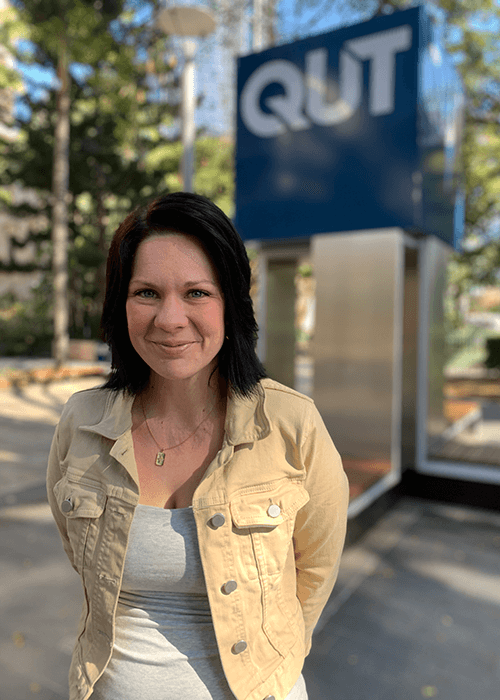PhD candidate Megan Godwin’s journey to social research wasn’t straightforward.
“I started off as a performing arts student when I first went to university,” she says. “It wasn’t until I volunteered during the Brisbane Festival, surveying festival goers about what events they liked attending that I realised I was interested in marketing.”
For someone who has always been interested in people and drivers of their behaviours, marketing was a natural fit. With a marketing degree in hand, she spent some years working in the film, TV and advertising industries.
“I’ve always been really fascinated with theories associated with marketing, like economics and psychology. Taking a multi-disciplinary approach to learning about people’s preferences to build a product that suits them made a lot of sense to me”
The idea of wanting to research human behaviour was always present though, and she went back to part-time study and completed her honours in 2014. Her honours thesis explored the connection between group dynamics and young women’s alcohol consumption.

“Alcohol consumption is a social practice, so it makes sense to explore young women’s decisions with people they do the behaviour with. This meant conducting focus groups with young women and really getting to the heart of what is enjoyable about drinking with friends, or, what detracts from a good time”.
When she decided to pursue a PhD in women’s health behaviour, social research had identified that the ‘at risk of alcohol consumption’ age had shifted to an older demographic. The social marketing and behavioural economics approach to investigating women’s behaviour could provide a deeper understanding to behaviour change.
“What we see in public health campaigns is a tendency to not completely address the competing priorities or the patterned decision-making style that women may use. My research looks not only at women’s health behaviours but why they have these behaviours – like the value the behaviour may have as a coping mechanism.”
Working with the Housing Income and Labour Dynamics in Australia (HILDA) longitudinal data, one of Ms. Godwin’s studies investigates health behaviour in relation to subjective wellbeing evaluations. Her research focuses on women aged between 30 and 65 years old, as she re-dubs the 1980’s ‘sandwich generation’ adage into three cohorts.
In her research, the 30-40-year-old age group are the “Vegemite sandwich” generation. Typically, they have young children (who consume Vegemite sandwiches!) and are juggling return-to-work and childcare commitments. The 40-50-year-old age group are the “smashed avocado sandwich” – typically juggling high work pressures and caring not only for children but ageing parents as well. The 50-65-year-old age group are dubbed the “club sandwich” generation, where shifts in lifestyle are reflected in reduced health satisfaction levels, but higher life satisfaction levels.
The term ‘sandwich generation’ itself is not a new way of segmenting women to investigate how they manage caring duties with professional interests – the term has been around since the eighties.
“The sandwich titles I use are a very Australian way of naming groups of women and it gets a lot of attention in international health research conferences as it taps into existing understandings and societal biases. Having said that, there was one mix-up where an international conference put my presentation in the ‘food’ category as they thought I was talking about actual sandwiches!”
Ms. Godwin’s research is ultimately about recognising that health behaviours don’t happen in a vacuum – they are influenced by many other factors.
“Unfortunately, many government public health campaigns focus on one specific behaviour, rather than taking a cluster approach and addressing related behaviours and drivers of that behaviour. For instance, physical activity is important for mental health, but health campaigns never recognise that there are secondary factors that influence desires for physical activity including lack of sleep, socio-economic status and caring responsibilities.”
“I’m fascinated by the progress of Australian women over the last 40 years, and particularly interested in exploring the way the gendered nature of society impacts how women manage competing priorities.”
“This is why the opportunity to partner with YWCA on their inaugural We Speak survey was so attractive, as data from We Speak will tell us how different things like leadership opportunities, civic engagement, housing access and economic security can impact women’s health and life outcomes.”
Meeting and creating a connection with YWCA Australia happened organically, outside of the regular corporate networking channels.
“I first encountered YWCA through their Company Secretary Kate O’Donohue who I met at the school gate – our kids go to the same school! Interested in my research, she connected me with their Research and Evaluation Specialist Susan Rudland. When we first met, there was a real ‘click’ where YWCA’s values and goals aligned perfectly with my research and the values of the BEST Centre where I am based.”
“Most importantly for me, YWCA’s goal for the We Speak research results to be used in influencing their policy, advocacy, and informing the services they deliver was critical. Research should be impacting public policy and services and knowing that We Speak data will do just that was a key factor in our collaboration.”
Ms. Godwin is due to complete her PhD in June 2021.
To participate in the We Speak survey, visit http://www.ywca.org.au/wespeak2020




